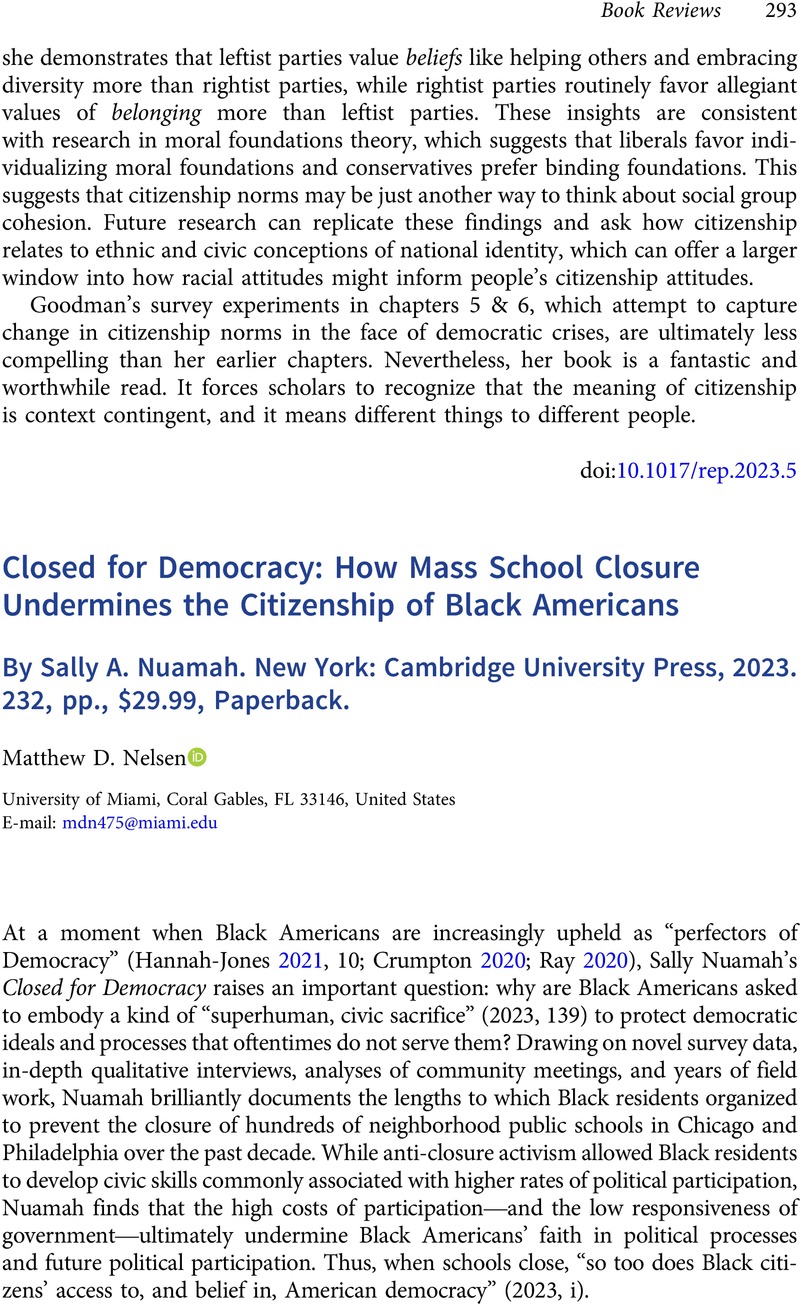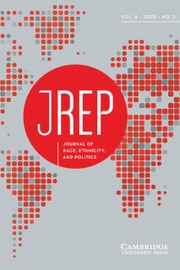No CrossRef data available.
Article contents
Closed for Democracy: How Mass School Closure Undermines the Citizenship of Black Americans By Sally A. Nuamah. New York: Cambridge University Press, 2023. 232, pp., $29.99, Paperback.
Review products
Closed for Democracy: How Mass School Closure Undermines the Citizenship of Black Americans By Sally A. Nuamah. New York: Cambridge University Press, 2023. 232, pp., $29.99, Paperback.
Published online by Cambridge University Press: 31 March 2023
Abstract
An abstract is not available for this content so a preview has been provided. Please use the Get access link above for information on how to access this content.

- Type
- Book Review
- Information
- Copyright
- © The Author(s), 2023. Published by Cambridge University Press on behalf of The Race, Ethnicity, and Politics Section of the American Political Science Association
References
Almond, Gabriel A., and Verba, Sidney. 1963. The Civic Culture. Princeton, N.J: Princeton University Press. https://press.princeton.edu/books/hardcover/9780691651682/the-civic-culture.CrossRefGoogle Scholar
Amna, E., and Ekman, J.. 2014. “Standby Citizens: Diverse Face of Political Passivity.” European Political Science Review 6 (6): 261–81.CrossRefGoogle Scholar
Bonilla, Sade, Dee, Thomas S., and Penner, Emily K.. 2021. “Ethnic Studies Increases Longer-Run Academic Engagement and Attainment.” Proceedings of the National Academy of Sciences 118 (37): e2026386118. https://doi.org/10.1073/pnas.2026386118.CrossRefGoogle ScholarPubMed
Bruch, Sarah K., and Soss, Joe. 2018. “Schooling as a Formative Political Experience: Authority Relations and the Education of Citizens.” Perspectives on Politics 16 (1): 36–57. https://doi.org/10.1017/S1537592717002195.CrossRefGoogle Scholar
Campbell, David E. 2008. “Voice in the Classroom: How an Open Classroom Climate Fosters Political Engagement Among Adolescents.” Political Behavior 30 (4): 437–54. https://doi.org/10.1007/s11109-008-9063-z.CrossRefGoogle Scholar
Crumpton, Taylor. 2020. “Black Women Saved the Democrats. Don’t Make Us Do It Again. - The Washington Post.” The Washington Post. https://www.washingtonpost.com/outlook/2020/11/07/black-women-joe-biden-vote/.Google Scholar
Hannah-Jones, Nikole, and The New York Times Magazine. 2021. The 1619 Project: A New Origin Story. Edited by Roper, Caitlin, Silverman, Ilena, and Silverstein, Jake. New York: One World.Google Scholar
Hess, Diana E. 2009. Controversy in the Classroom: The Democratic Power of Discussion. Routledge.CrossRefGoogle Scholar
Nelsen, Matthew D. 2019. “Cultivating Youth Engagement: Race & the Behavioral Effects of Critical Pedagogy.” Political Behavior, October. https://doi.org/10.1007/s11109-019-09573-6.Google Scholar
Pierson, Paul. 1993. “When Effect Becomes Cause: Policy Feedback and Political Change.” World Politics 45 (4): 595–628. https://doi.org/10.2307/2950710.CrossRefGoogle Scholar
Ray, Rashawn. 2020. “How Black Americans Saved Biden and American Democracy.” Brookings. November 24, 2020. https://www.brookings.edu/blog/how-we-rise/2020/11/24/how-black-americans-saved-biden-and-american-democracy/.Google Scholar
Riehl, Carolyn J. 2009. “The Principal’s Role in Creating Inclusive Schools for Diverse Students: A Review of Normative, Empirical, and Critical Literature on the Practice of Educational Administration.” Journal of Education 189 (1–2): 183–97. https://doi.org/10.1177/0022057409189001-213.CrossRefGoogle Scholar
Sapiro, Virginia. 2004. “Not Your Parents’ Socialization: Introduction for a New Generation.” Annual Review of Political Science 7 (1): 1–23. https://doi.org/10.1146/annurev.polisci.7.012003.104840.CrossRefGoogle Scholar
Verba, Sidney, Lehman Schlozman, Kay, and Brady, Henry. 1995. Voice and Equality: Civic Voluntarism in American Politics. Cambridge, MA: Harvard University Press.CrossRefGoogle Scholar


